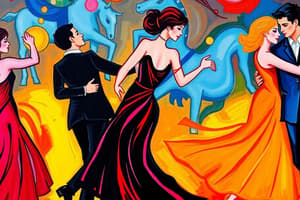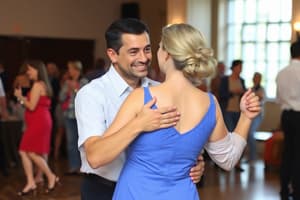Podcast
Questions and Answers
What is the primary purpose of social dance?
What is the primary purpose of social dance?
Recreation and socialization
Which dance is known for its characteristic rhythmic pattern based on quick three-step movement?
Which dance is known for its characteristic rhythmic pattern based on quick three-step movement?
- Tango
- Cha Cha (correct)
- Waltz
- Foxtrot
The American Rumba allows for slower speed and steps compared to its International counterpart.
The American Rumba allows for slower speed and steps compared to its International counterpart.
False (B)
What are the dances classified under Latin American dances?
What are the dances classified under Latin American dances?
Which dance is described as smooth and designed with continual flowing movements?
Which dance is described as smooth and designed with continual flowing movements?
Match the following dances with their associated styles:
Match the following dances with their associated styles:
Social dances are primarily intended for performance rather than participation.
Social dances are primarily intended for performance rather than participation.
In the ______ dance, partners remain connected from start to finish.
In the ______ dance, partners remain connected from start to finish.
Which dance allows dancers to navigate in and out of 'traffic' on the floor?
Which dance allows dancers to navigate in and out of 'traffic' on the floor?
Flashcards
Social Dance
Social Dance
A group or couple dance for social and recreational purposes, often done for enjoyment, socialization, and health.
Latin American Dance
Latin American Dance
A category of social dances originating in Latin America, often characterized by rhythmic and passionate movements.
Cha Cha
Cha Cha
A fast Latin American dance with a three-step rhythmic pattern.
Rumba
Rumba
Signup and view all the flashcards
Waltz
Waltz
Signup and view all the flashcards
Foxtrot
Foxtrot
Signup and view all the flashcards
Tango
Tango
Signup and view all the flashcards
Viennese Waltz
Viennese Waltz
Signup and view all the flashcards
Quickstep
Quickstep
Signup and view all the flashcards
Modern Standard Dance
Modern Standard Dance
Signup and view all the flashcards
Study Notes
Social Dance Classification
- Social dances are partner dances, often for enjoyment, socialization, recreation, and health.
- Social dances are usually accompanied by music which adds to the enjoyment and coordination.
Learning Outcomes
- Students will be able to identify different types of social dances and their basic steps.
- Students will be able to confidently perform the dance steps.
- Students will identify the time signature of basic dance steps.
Classification of Social Dances
- Latin American Dances
- Originate from Europe and the Americas.
- Often passionate, fiery, and flashy.
- Generally faster paced and more sensual.
- Styles include Cha-cha, Rumba, Samba, Paso Doble, Jive/Boogie, Swing, Merengue, Salsa, and Mambo.
- Modern Standard Dances
- Collective of dances including: Modern Waltz, Quickstep, Slow Foxtrot, Tango, and Viennese Waltz.
- Internationally recognized for competition and teaching diplomas.
- Formal attire is required (ankle length gown for females, coat and tie for males).
Origin of Dances
- Latin American dances have origins in: Cuba, Brazil, Cuba, Spain, USA, Dominican Republic, USA, USA
- Modern Standard dances have origins in: Austria, Argentina, Vienna, USA, USA
Cha Cha
- A fast ballroom dance from Latin America.
- Similar in style to mambo.
- Follows a rhythmic pattern based on a quick three-step movement.
Rumba
- A mixture of International Cha-cha and Rumba.
- Faster pace and steps compared to its International counterpart.
- Includes bent-to-straight leg action and strongly accentuated Cuban movements.
Waltz
- A classic and elegant ballroom dance (think Cinderella).
- Characterized by a "123" rhythm.
- Partners remain in close hold throughout the dance.
Mambo
- A Latin American dance.
Jive
- A Latin American dance.
Merengue
- A Latin American dance.
Salsa
- A Latin American dance.
Foxtrot
- A progressive dance with continuous, smooth movements.
- Often danced to big band music, especially vocals.
- Created in the 1910s and reached its peak in the 1930s.
Tango
- An eccentric and passionate dance combining Smooth International style with the classic Argentinian Tango style.
- Includes staccato actions, straight lines, and sharp changes.
Quickstep
- A fast-paced dance involving leaps, kicks, and running movements, often connected to other dancers.
- Includes Tetris-style dancing and "traffic" patterns on the floor.
Viennese Waltz
- Characterized by its smooth and billowy emotional and fast-paced style.
- Considered an American Smooth style dance.
- It allows dancers to flow through multiple positions.
Activity Instructions
- Divide into groups of 6-8.
- Create a dance pattern using basic steps and partner positions.
- The counts and repetitions depend on the group.
- Perform the dance with minimum 1-minute music.
Rubrics
- Creativity of Movements (25%)
- Showing level of Confidence (25%)
- Mastery of Steps (25%)
- Coordination (25%)
- Total Score (100%)
References
- Various web links to dance resources.
Studying That Suits You
Use AI to generate personalized quizzes and flashcards to suit your learning preferences.




